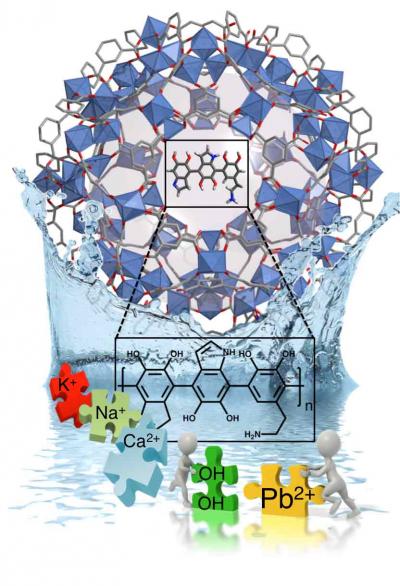Removing heavy metals from water with MOFs

A metal organic framework can remove lead from water samples, getting them to EPA-approved levels in seconds. Credit: American Chemical Society
There are many sources of exposure to toxic heavy metals. Lead, in particular, has been used in paints, ceramic glazes, jewelry, toys and in pipes. Current commercial methods to remove heavy metals including lead from municipal drinking water can be expensive in terms of money and energy and are inefficient.
In addition, some current approaches either are single-use, are difficult to regenerate or can produce significant toxic waste as a side product. Wendy L. Queen and colleagues sought to attack this issue with materials called metal organic frameworks (MOFs) that are networks of organic chemical 'struts' with metal nodes known to pull things like water and gases from air.
That ability, plus the large surface area and chemical tunability of MOFs make them a promising material to remove heavy metals selectively from water.
The researchers created a water-stable MOF/polymer composite with cheap, environmentally and biologically friendly materials and tested its ability to remove heavy metals from water. It had one of the highest reported removal capacities to date, removing over 1.6 times its own weight of mercury and 40 percent of its weight in lead. The researchers tested the MOFs in solutions with lead levels similar to those found in contaminated water samples from Flint, Michigan.
They found that the material can rapidly reduce lead concentrations to 2 parts per billion, which is the U.S. Environmental Protection Agency limit for drinkable levels. Further, the authors removed lead from various real-world water samples from the Rhone River, the Mediterranean Sea and a wastewater treatment plant in Switzerland. The researchers also demonstrated how the material could be regenerated easily without toxic products. The authors say they are now pursuing using other specially designed MOFs to remove other trace contaminants in water.
###
The authors acknowledge funding from the Swiss National Science Foundation, the German Research Foundation, the Department of Energy and the Swiss National Supercomputing Center.
This paper will be freely available on Wednesday, March 14, at 8 a.m. ET at https:/
The American Chemical Society is a nonprofit organization chartered by the U.S. Congress. With nearly 157,000 members, ACS is the world's largest scientific society and a global leader in providing access to chemistry-related research through its multiple databases, peer-reviewed journals and scientific conferences. ACS does not conduct research, but publishes and publicizes peer-reviewed scientific studies. Its main offices are in Washington, D.C., and Columbus, Ohio.
To automatically receive news releases from the American Chemical Society, contact newsroom@acs.org.
Media Contact
All latest news from the category: Materials Sciences
Materials management deals with the research, development, manufacturing and processing of raw and industrial materials. Key aspects here are biological and medical issues, which play an increasingly important role in this field.
innovations-report offers in-depth articles related to the development and application of materials and the structure and properties of new materials.
Newest articles

A universal framework for spatial biology
SpatialData is a freely accessible tool to unify and integrate data from different omics technologies accounting for spatial information, which can provide holistic insights into health and disease. Biological processes…

How complex biological processes arise
A $20 million grant from the U.S. National Science Foundation (NSF) will support the establishment and operation of the National Synthesis Center for Emergence in the Molecular and Cellular Sciences (NCEMS) at…

Airborne single-photon lidar system achieves high-resolution 3D imaging
Compact, low-power system opens doors for photon-efficient drone and satellite-based environmental monitoring and mapping. Researchers have developed a compact and lightweight single-photon airborne lidar system that can acquire high-resolution 3D…





















